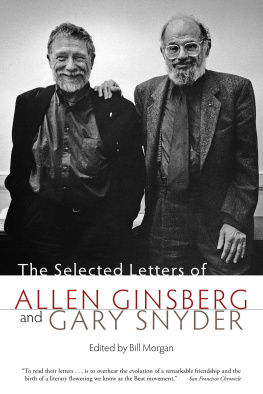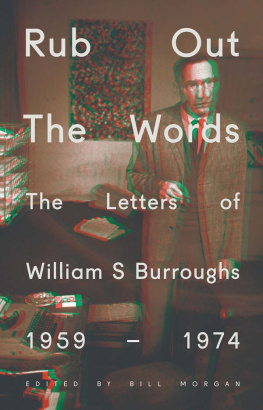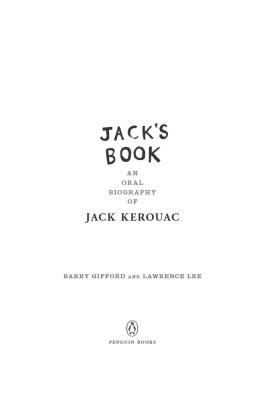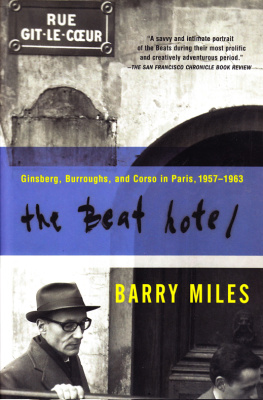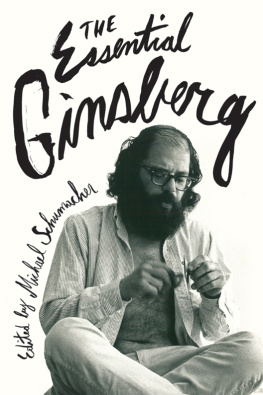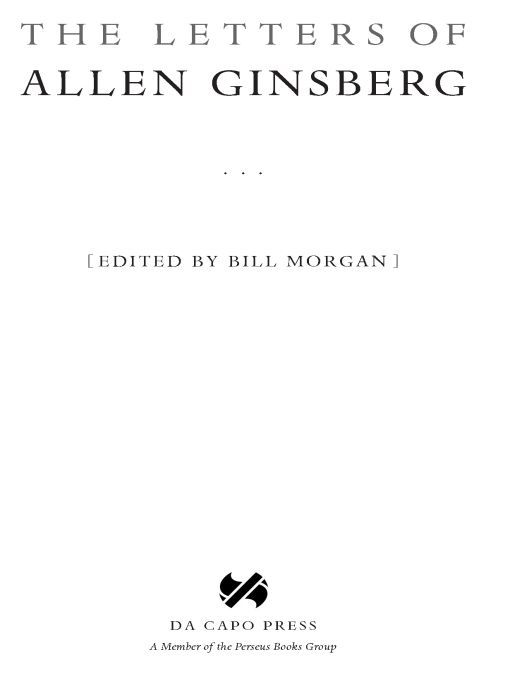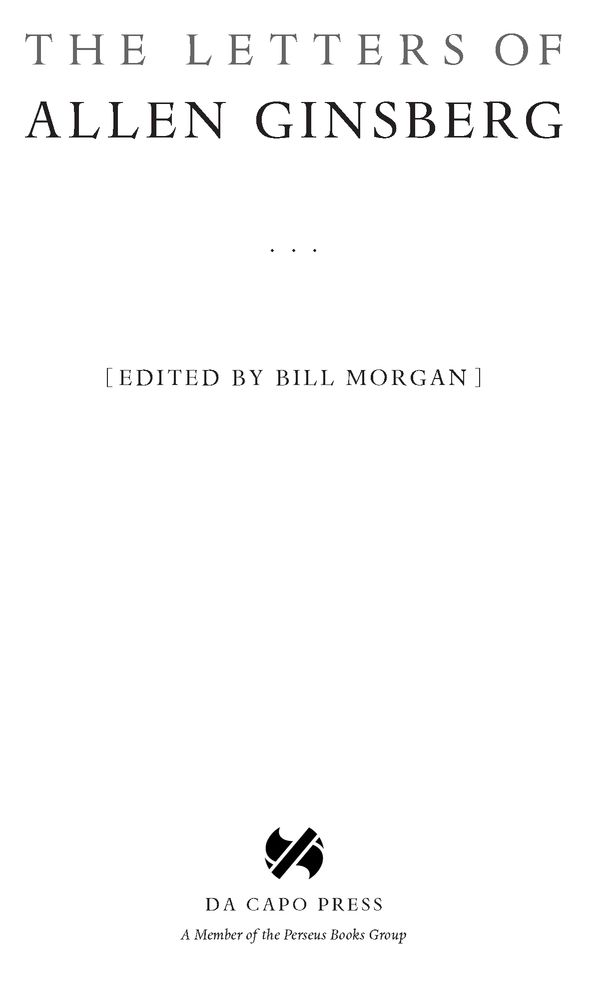Table of Contents
ALSO BY ALLEN GINSBERG
Select Bibliography
POETRY BOOKS
Collected Poems 1947-1997
Death & Fame: Last Poems 1993-1997
Selected Poems 1947-1995
Illuminated Poems
Cosmopolitan Greetings: Poems 1986-1992
White Shroud Poems 1980-1985
Howl Annotated
Plutonian Ode: And Other Poems 1977-1980
Mind Breath: Poems 1972-1977
The Fall of America, Poems of These States 1965-1971
Planet News 1961-1967
Reality Sandwiches: 1953-1960
Kaddish and Other Poems 1958-1960
Howl and Other Poems
PROSE & PHOTOGRAPH BOOKS
The Book of Martyrdom & Artifice: First Journals and Poems 1937-1952
Family Business: Selected Letters Between a Father & Son
Deliberate Prose: Selected Essays 1952-1995
Spontaneous Mind: Selected Interviews, 1958-1996
Indian Journals
Journals Mid-Fifties: 1954-1958
Allen Ginsberg Photographs
Journals: Early Fifties, Early Sixties
RECORDINGS
Howl
Kaddish
Gat
First Blues
Hydrogen Jukebox
The Lion for Real
Holy Soul Jelly Roll
The Voice of the Poet: Allen Ginsberg
For further bibliographic information visit
www.allenginsberg.org
ALSO BY BILL MORGAN
The Book of Martyrdom & Artifice: First Journals and Poems 1937-1952 (editor with
Juanita Lieberman-Plimpton, by Allen Ginsberg)
I Celebrate Myself: The Somewhat Private Life of Allen Ginsberg
The Beat Generation in San Francisco
Literary Landmarks of New York
The Beat Generation in New York: A Walking Tour of Jack Kerouacs City
The Works of Allen Ginsberg 1941-1994: A Descriptive Bibliography
The Response to Allen Ginsberg, 1926-1994: A Bibliography of Secondary Sources
Lawrence Ferlinghetti: A Comprehensive Bibliography
Howl on Trial: The Struggle for Free Expression (editor)
Youll Be Okay: My Life with Jack Kerouac (editor, by Edie Kerouac-Parker)
An Accidental Autobiography: The Selected Letters of Gregory Corso (editor)
Deliberate Prose: Selected Essays, 1952-1995 (editor, by Allen Ginsberg)
Death & Fame: Last Poems, 1993-1997
(editor with Bob Rosenthal and Peter Hale, by Allen Ginsberg)
... more than kisses, letters mingle souls; For, thus friends absent speak.
JOHN DONNE TO SIR HENRY WOTTON
PROLOGUE
April 2008
Dear Reader,
Twenty-five years ago, Allen Ginsberg asked me to edit a collection of his correspondence as part of a multiple book contract. At the time, Barry Miles was working on a biography about Ginsberg, and he suggested that because he was already collecting copies of letters by Allen to various people, it might be better for him to edit the book. As a result I teamed up with Juanita Lieberman to edit Ginsbergs earliest journals, a project that was published in 2006 as The Book of Martyrdom and Artifice. For years the letters project languished under the overwhelming volume of material, and nothing ever came of it. Then, shortly after Allens death in 1997, I began working on my own Ginsberg biography, also published in 2006 as I Celebrate Myself: The Somewhat Private Life of Allen Ginsberg. For that book I collected my own gigantic stack of Ginsberg letters, and my enthusiasm for editing the selected correspondence book was rekindled. Now, a decade later, after having unearthed more than 3,700 Ginsberg letters from every corner of the world, Ive pared them down to this edition of 165 of the very best.
Gathering together the best of the best is exactly how I approached the selection process. After putting the fifteen-ream pile of letters into chronological order, I read each and made a decision based on the only criteria, was it an extraordinary letter or not? It ended up being a greatest hits album of correspondence. As I followed that single rule, it didnt matter whether the letter was to Jack Kerouac or Joe Blow. What mattered were the quality of the writing and the significance of the content. In the end the selection turned out to have a little of everything, including wonderful letters to Jack Kerouac, William S. Burroughs, Lawrence Ferlinghetti, and most of his Beat Generation friends. Letters to politicians from Dwight Eisenhower to Bill Clinton, dozens of letters to the editors of newspapers and magazines, and fan letters to a few of Allens heroes also survived the weeding process. The final volume is a book that can be read from cover to cover or dipped into at random, letters to savor at ones leisure. Nearly every letter is complete in itself and therefore only needs minor editorial setup. The volume doesnt pretend to tell Allens life story or detail his literary career, but it does attempt to show his talent as a correspondent. I would have loved to include all 3,700 letters, fully annotated, but that is a project for a future scholar with an enormous publishing budget.
Strictly speaking, a man of letters is not someone who has written a lot of letters but rather someone who is actively engaged in the literary and intellectual world. Allen Ginsberg was both. Wherever he was, whatever he was doing, he did it with paper and pen nearby. At any moment he might write a poem, make a notebook entry, or pen a letter to a friend. After seventy years, he left behind an enormous depository of documents to study. He has even been criticized by reviewers for writing too much, as if there could ever be too much material to help expand our knowledge.
The letters in this volume present a side of Ginsberg that his poetry, journals, and essays do not. Allens letters are largely responses to something, quite often responses to letters from his correspondents. That sets them apart markedly from Ginsbergs other writings because in other formats Allen had an aversion to writing on demand. At times requests to write on a particular subject became torturous ordeals for him. He experienced writers block when it came to composing introductions, blurbs, or other writing for particular purposes. For example, in the 1960s Ginsberg promised to put together his South American journals for publisher Dave Haselwood. After years of delay, Ginsberg had to admit he just couldnt write or edit on a schedule; the mood had to be with him. A decade later the mood still hadnt struck him, and Allen gave Haselwood his Indian Journals as a substitute.
Ginsbergs letters were a different matter entirely. The subjects for those were nearly always determined by other people, which seems to be the very nature of many letters. Someone writes to you and you respond on the spot. If you put it off for weeks or months, quite possibly the letter will never be written, so it is almost always immediate and unrehearsed. After writing a poem, a poet can look back on it, go over it and revise it, spend as much time on it as hed like, and then at some point declare it finished or discard it altogether. By contrast a letter is often written in haste and dropped into a mailbox without revision. Once posted it cant be recalled.
There was an enormous range in the subject matter of Ginsbergs letters. They might be a political tirade to his father, or a postcard from afar, or a reply to a young fan who hoped that Ginsberg would discover him. Often they were his only means of keeping in touch with friends as he or they traveled around the world. At other times he used letters to respond to media stories he disagreed with. Quite often in those cases the letter was directed to the New York Times, the newspaper Allen loved to hate.


